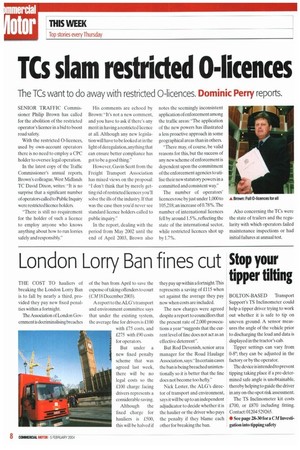TCs slam restrided 0-licences
Page 8

If you've noticed an error in this article please click here to report it so we can fix it.
The TCs want to do away with restricted 0-licences. Dominic Perry reports.
SENIOR TRAFFIC Commissioner Philip Brown has called for the abolition of the restricted operator's licence in a bid to boost road safety.
With the restricted 0-licences, used by own-account operators there is no need to employ a CPC holder to oversee legal operation.
In the latest copy of the Traffic Commissioner's annual reports. Brown's colleague, West Midlands TC David Dixon, writes: "It is no surprise that a significant number of operators called to Public Inquiry were restricted licence holders "There is still no requirement for the holder of such a licence to employ anyone who knows anything about how to run lorries safely and responsibly." His comments are echoed by Brown: "It's not a new comment, and you have to ask if there's any merit in having a restricted licence at all. Although any new legislation will have to be looked at in the light of deregulation, anything that can ensure better compliance has got to be a good thing.
However. Gavin Scott from the Freight Transport Association has mixed views on the proposal: don't think that by merely getting rid of restricted licences you'll solve the ills of the industry. If that was the case then you'd never see standard licence holders called to public inquiry."
In the report. dealing with the period from May 2002 until the end of April 2003, Brown also notes the seemingly inconsistent application of enforcement among the traffic areas: The application of the new powers has illustrated a less proactive approach in some geographical areas than in others.
"There may, of course. be valid reasons for this, but the success of any new scheme of enforcement is dependent upon the commitment of the enforcement agencies to utilise their new statutory powers in a committed and consistent way."
The number of operators' licences rose by just under 1,000 to 105,218; an increase of 0.78°/0.The number of international licences fell by around 1.5%, reflecting the state of the international sector, while restricted licences shot up by 1.7°/0. Also concerning the TCs were the state of trailers and the regularity with which operators failed maintenance inspections or had initial failures at annual test.


































































































































































































